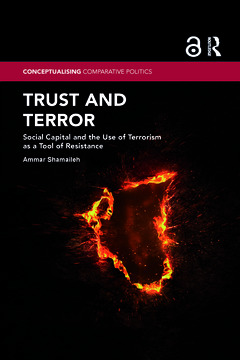Trust and Terror Social Capital and the Use of Terrorism as a Tool of Resistance Conceptualising Comparative Politics Series

Why do some individuals choose to protest political grievances via non-violent means, while others take up arms? What role does whom we trust play in how we collectively act?
This book explores these questions by delving into the relationship between interpersonal trust and the nature of the political movements that individuals choose to join. Utilizing the examples of the Arab Spring uprisings in Egypt, Libya and Syria, a novel theoretical model that links the literature on social capital and interpersonal trust to violent collective action is developed and extended. Beyond simply bringing together two lines of literature, this theoretical model can serve as a prism from which the decision to join terrorist organizations or violent movements may be analyzed. The implications of the theory are then examined more closely through an in-depth look at the behavior of members of political movements at the outset of the Arab Spring, as well as statistical tests of the relationship between interpersonal trust and terrorism in the Middle East and globally.
Trust and Terror will be of interest to scholars of Comparative Politics and International Relations.
The Open Access version of this book, available at https://doi.org/10.4324/9781315505817, has been made available under a Creative Commons Attribution-Non Commercial-No Derivatives 4.0 license.
Table of Contents
Preface
Chapter 1: Introduction
Chapter 2: Trust, Terror and The Arab Spring: Egypt, Libya And Syria
Chapter 3: Theory: The Relationship Between Trust And Terror
Chapter 4: Islamist Political Mobilization In Egypt, Libya And Syria
Chapter 5: The Syrian Protester’s Dilemma
Chapter 6: Generalized And Particularized Interpersonal Trust And Support For Terrorism: Evidence From Five Arab States
Chapter 7: Generalized Interpersonal Trust And The Prevalence Of Domestic Terrorist Activity: A Cross-Country Study
Chapter 8: Conclusion
References
Appendices
Appendix A
Appendix B
Appendix C
Index
Ammar Shamaileh is an assistant professor in the Department of Political Science at the University of Louisville, USA. His current research agenda focuses primarily on the relationship between informal institutions or cultural phenomena and political behavior and violence in the Middle East.
Date de parution : 09-2020
15.2x22.9 cm
Date de parution : 05-2017
15.2x22.9 cm
Mots-clés :
Young Man; Ordered Probit Regression Model; Comparative Politics; Saif Al Islam Al Qaddafi; Middle East; Generalized Interpersonal Trust; Middle East Politics; Primary Regression Models; International Relations; Amelia II; Arab Spring; Primary Regression Analysis; Social Capital; Abdelhakim Belhadj; Trust; Rebel’s Dilemma; Social Networks; National Transitional Council; Political Violence; Mohammed Bouazizi’s Self-immolation; Terrorism; Abdel Fattah El Sisi; Participation; Particularized Trust; Ad-Da’wa Al-Salafiya; Jabhat Al Nusra; Social Movements; Large Scale Collective Action; Protest; Arab Barometer; Revolution; Domestic Terrorist Activity; Qudsaya; Domestic Terrorist Incidents; Egypt; Indirect Negative Relationship; Libya; Ethno Linguistic Fractionalization; Syria; Salafist Clerics; Resistance; National Transition Council; Aggrieved Citizen; Imputation Model; Free Syrian Army



